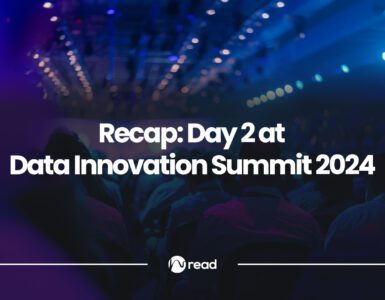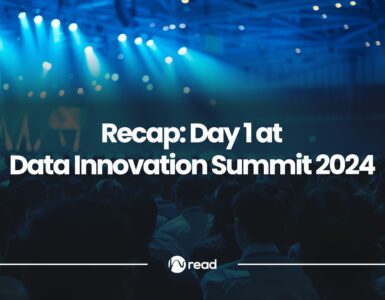As we navigate through a wave of technological advancements, we bear witness to substantial progress in cutting-edge innovations. The development of artificial intelligence is a notable example, characterized by the introduction of ChatGPT and the rise of Generative AI and Large Language Models.
These developments signify a major shift in the corporate adoption of AI, transforming it from a niche technological pursuit to a central element of business strategy and operations. AI has transcended its initial boundaries, now actively utilized across various levels of the organization, from C-suite executives to operational staff. The integration of LLMs into diverse business functions is a robust commitment to leveraging this revolutionary technology.
In this article, we delve into the experiences and insights of industry leaders, understanding how AI is not just reshaping operational processes but also redefining the landscape of business innovation and competitive strategy in 2024.


1. Generative AI Strategy = Data Strategy
As one of the speakers at the annual Data Innovation Summit 2023, Matt Turner is a seasoned professional with expertise as a Chief Technology Officer. He helps Chief Revenue Officers and Chief Marketing Officers in constructing robust customer relationships, formulating impactful campaigns, and accelerating the adoption of data and AI products.
In a profound comment, Matt envisions the integration of generative AI into enterprise strategies, emphasizing that in 2024, a crucial realization will occur: generative AI strategy is, in fact, synonymous with data strategy.
Furthermore, Matt states that data and AI aren’t connected or related; rather, they are integral components of a broader work dedicated to delivering intelligence. According to his perspective, the symbiotic relationship between data and AI becomes apparent, asserting that the existence of effective generative AI is contingent upon well-organized and secure data. Conversely, the true value of well-organized and secure data can only be realized with the support of AI.
2. Intersection of Knowledge Graphs and LLMs
Stefan Wendin, Head of Innovation Lab & Business Design at You Don’t Know What You Know / YDKWYK, is focused on driving transformation, innovation, and business growth by bridging the gap between technology and business. Having spoken at some of our past summits, Stefan is coming back again to take the Moderator Role in the Databases and Data Quality Track, at the upcoming Data Innovation Summit 2024 in Stockholm.
Stefan tackles the question of how do knowledge graphs and language models shape the future of AI in business. He explores the synergy between knowledge graphs and large language models in business, and the intersection of these technologies in the realm of AI and its potential impact on business competitiveness. The article “The Future of AI in Business: Unifying Knowledge Graphs and Large Language Models?” acknowledges the growing significance of large language models like ChatGPT and GPT-4. While recognizing their promising capabilities for various applications, Stefan emphasizes the challenges associated with implementing LLMs in business operations, including issues like data inconsistency, language biases, and high operational costs. To address these challenges, knowledge graphs are a crucial component in ensuring the effective implementation of LLMs.
Stefan highlights the imperative of LLMs in business, emphasizing that despite initial buzz, these technologies are not passing trends. Challenges in deploying LLMs are explored, like high costs, complex requirements for training, data inconsistency and language limitations. Moreover, Stefan advocates for leveraging knowledge graphs for LLM efficacy, contending that it presents a structured approach to overcome inherent limitations within LLMs. By harnessing the power of a knowledge graph, a comprehensive mapping of relationships between diverse entities can be achieved. This integration of knowledge graphs into LLMs has the potential to address the challenges and optimize their performance. The roadmap for unification of LLMs and knowledge graphs is outlined, presenting frameworks such as KG-Enhanced LLMs, LLM-Augmented KGs, and Synergized LLMs + KGs. These frameworks aim to enhance the understanding of contextual and factual information, streamline various KG tasks, and create a bidirectional reasoning framework, respectively.
The article concludes with four key use-cases for the integration of knowledge graphs and LLMs, including creating knowledge graphs through LLMs, training LLMs on existing knowledge graphs, enriching LLM interactions via knowledge graphs, and developing better AI models with knowledge graphs.
Moreover, read more about 7 key insights and predictions for AI in 2024. This article presents a forward-looking analysis, grounded in current advancements and emerging trends, to paint a vivid picture of AI’s trajectory in the near future.
3. Value Creation with Data Science and Responsible AI
Winfried Adalbert Etzel, Podcast host for MetaDAMA and Data Governance thought leader, as well as Data Operations Manager for Data Governance & Architecture at AkerBP, shares his thoughts on the future by expressing four predictions or aspirations that he would like to see more of in 2024. Furthermore, Winfried will be presenting at the upcoming Data Innovation Summit 2024 in Stockholm, showcasing his expertise as a data professional.
In a discussion on MetaDAMA, Winfriend delved into the redefinition of Data Scientists with Carl Johan Rising. Many organizations have yet to fully grasp the requirements for data science to generate meaningful value. Looking ahead to 2024, Winfried anticipates a heightened emphasis on value creation, though the specifics regarding experimentation and hypothesis-based environments remain uncertain. Reflecting on the state of genAI, we’ve observed quality fluctuations in Large Language Models. He anticipates a shift toward a more customized and diverse approach, which will undoubtedly pose new challenges. The importance of Responsible AI and explainability will reach unprecedented levels as ethics will become more important than ever.
2024 – Potential Year for Quantum AI
Forbes has already highlighted Quantum AI in its predictions for 2024, suggesting a trend towards more specialized problem-solving through AI. This, in turn, will necessitate greater computational power than ever before. As we move forward, a return to the basics is imminent. Data management will emerge as a focal point for many organizations. The need to address and mitigate issues of unreliable data in and out, becomes more crucial than ever.
4. Mainstream AI Integration and Staff Empowerment
Conny Svensson, Director of AI Adoption, actively facilitates the integration of AI in Sweden to address societal and business challenges within the country. He was also one of the nominees for the Data and AI Influencer of the Year award at the DAIR Awards 2023 in Stockholm.
Several organizations are actively assessing employees’ utilization of AI tools, particularly those related to GenAI, as part of their performance evaluation processes. The expectation now is that individuals must leverage AI for productivity and optimal work creation. Deeming reliance on traditional methods as unacceptable. The focus has shifted from determining the appropriate courses or classes for personal development to identifying tools and tasks that can be enhanced through the integration of AI within one’s role. Analysts anticipate that this trend will gain even more momentum in 2024.
5. The Rise of RAG – Customized Solutions over One-Size-Fits-All
Johan Harvard, VP Strategic Advisory at Silo AI, sees GenAI opening the eyes of industry to traditional ML and the huge untapped potentials that industry still has with “classical” AI, pre-ChatGPT. The large industrials are like supertankers, slow to move but immensely powerful when they do – and the shift has definitely started in many organizations.
From his perspective, 2024 will be even more about RAG than 2023 – going beyond the simplistic one-size-fits-all solutions to bespoke use case specific solutions, where the smartness of the retriever solution will play a huge role, not just the LLM.
In Conclusion
The insights shared by these thought leaders paint a vivid picture. In this future, generative AI is not just an add-on but a core component of enterprise strategy.
Looking forward, integrating AI technologies like LLMs, knowledge graphs, and responsible practices is vital for driving innovation and maintaining competitiveness. In 2024, businesses are shifting from generalized solutions to customized, data-driven approaches. This marks the journey towards AI maturity, emphasizing the need for them to adapt, evolve, and embrace these changes.
AI powers the present and represents an exciting era for enterprises ready to harness its full potential.
Stay at the forefront of the transformative journey of artificial intelligence and data by subscribing to Hyperight Premium.














Add comment